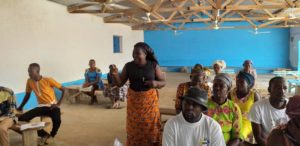Women denied access to farmlands in Vea Irrigation project communities
 Customary land tenure system of the Vea Traditional Area in the Bongo District has denied many women access to farmlands to participate in agricultural activities especially during the dry season, a research has revealed.
Customary land tenure system of the Vea Traditional Area in the Bongo District has denied many women access to farmlands to participate in agricultural activities especially during the dry season, a research has revealed.
The research conducted in the Vea Irrigation Project communities including Vea, Gowrie, Zaare, Yikine, Yorogo, Sumbrungu and Nyariga revealed that majority of women in the communities did not have equal opportunity as men, to access irrigation lands for farming during the dry season.
It was conducted by the Ae-ebise Women Association (ABIWA), a women farmer group with technical and funding support from the Business Sector Advocacy Challenge (BUSAC) Fund and its donors, Danish International Development Agency (DANIDA), United States Agency for International Development (USAID) and the European Union (EU).
Mr Patrick Anamoo, the Focal Person of the group, who disseminated the findings in the Vea Community, explained that the study sought to understand how women could access irrigated land in the Vea Irrigation Project area considering the patrilineal customary system practiced in the area and also ascertain the perception of individuals and communities’ about women limited access to irrigated land and the effect on their livelihood.
He said ABIWA was formed in 2013 with the idea of promoting gender equality and equity in the Bongo District of the Upper East Region and currently had 378 women engaged in dry season farming, animal rearing and petty trading.
“The main economic activity in the area during the prolonged dry season is dry season farming and the inability of the women to have equal opportunity to access land in the Vea Irrigation Project areas is adversely affecting their livelihoods”.
The research showed that customary practices on land ownership, inheritance and sacrifices to the ancestral land gods were the major factors serving as stumbling blocks to women’s access to ownership of irrigated land in the Vea Irrigation project areas.
Only men inherit land and properties and the eldest son usually got the bigger portion of the land, implying that even if a woman was the eldest of the children in the family, she did not qualify to inherit her father’s property especially land.
In a situation where the deceased’s children were minors, the properties were inherited by the deceased’s surviving brother to be held in trust of such minors.
The research also found out that the management of the Vea Irrigation facility gave preferential treatment to the original owners of the land in the project areas before considering women, and 86 per cent of the women in the area did not know anything about land rights and were of the view that they did not have the right to own land since the tradition did not allow them.
According to some male opinion leaders in the area, men were heads of the family and had sole responsibility of taking care of women and provided their basic necessities such as shelter, food and clothing as demanded by tradition.
“Women are not part of the family. We married them from different families in different communities. They have no right to own land. They are just to help their husbands in whatever they do and to also cook for the family and not to struggle for land,” some of the opinion leaders said.
The research recommended that seminars and workshops be organized by the appropriate bodies to educate chiefs, family heads, elders, opinion leaders and traditional landowners, Tindanaas, on the current reforms in the customary land tenure system.
Source: GNA
